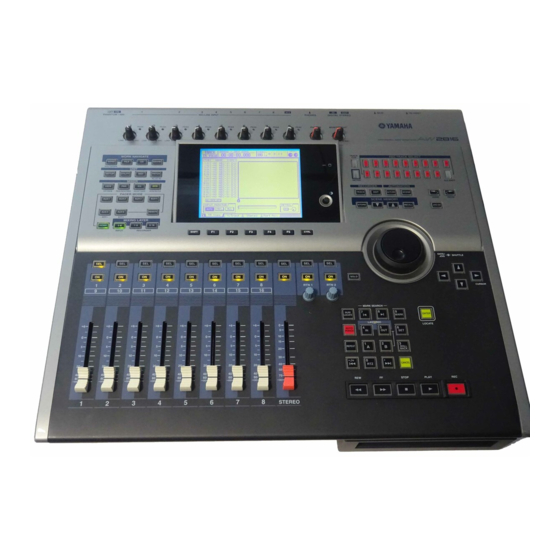Yamaha AW2816 Manual - Página 15
Procurar online ou descarregar pdf Manual para Instrumento musical Yamaha AW2816. Yamaha AW2816 32 páginas. Professional audio workstation, recording101
Também para Yamaha AW2816: Manual de operação (2 páginas), Manual de atualização (2 páginas), Tutorial (31 páginas)

The only input on the AW2816 that uses a RCA connector is the Digital Stereo Input. The
outputs of the AW2816 that use RCA connectors are the Stereo Outputs and the Digital Stereo
Input.
The Mixing Console
The mixing console is the heart of the recording studio. It is where all of the audio signals are
connected and ultimately mixed down to a stereo audio signal so that it can be recorded onto a 2-
track recorder such as a CD or cassette recorder.
A mixing console is made up of many different channel strips. A channel on a mixing console is
where a single audio signal is connected and then routed to an output on the mixing console. A
channel on a mixing console will also have an equalizer section. On some mixing consoles there
will also be a dynamic processor such as a compressor. In addition to the channel strips the
mixing console will also have a master section. This would be where all of the signals are
combined to a stereo mix and then routed to various outputs. These outputs would include
monitor outputs, stereo outputs for recording to a 2-track recorder, and possibly headphone or
cue outputs.
There are two basic types of mixing consoles used for recording:
Inline Mixing Console – Both the inputs and the playback controls are on the same
channel.
Split-Mixing Console – The input and playback controls are on separate dedicated
channels.
NOTE: Playback channels are also commonly referred to as tape return or monitor channels.
The AW2816 is a split-mixing console. The first 8 channels of the AW2816 are input channels.
The next 4 channels are stereo input channels that are used for the outputs of the two internal
effect processors. The remaining 16 channels are used for playback of the 16 internal tracks.
12
